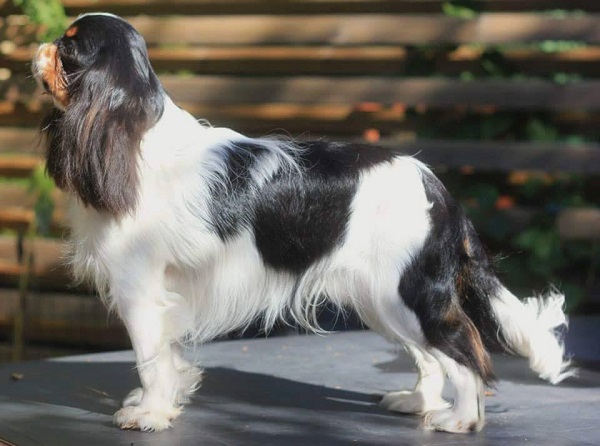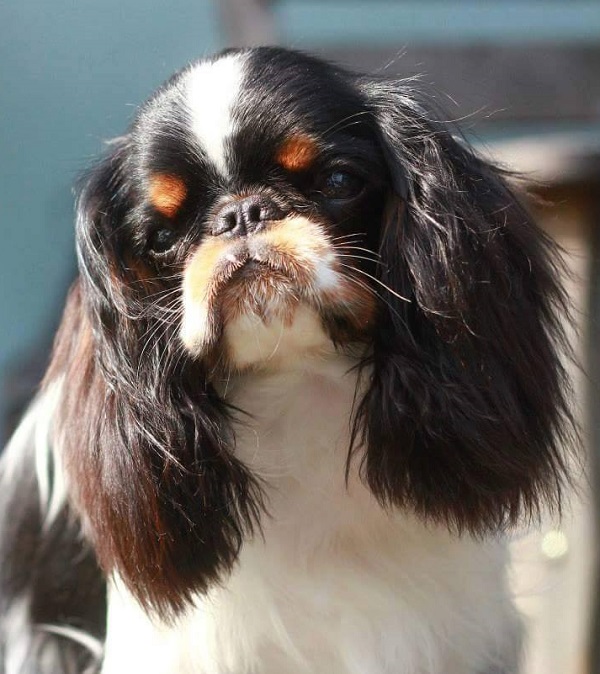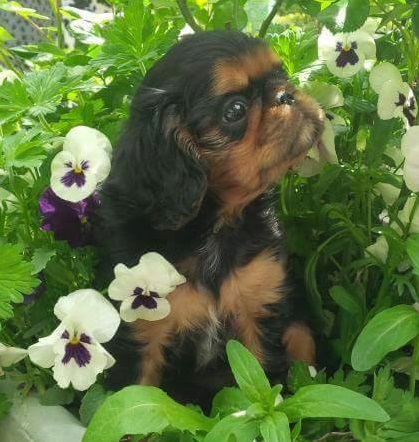|
A lot has already been written about the History of Charlies. So rather than reinventing the wheel, we have chosen to borrow the following Text with kind permission of breed specialist Irene Hess .
We at Bonitos Companeros Deluxe thank her for her help.
Origin and History:
The King Charles Spaniel has its origin in times of great ostentation. The breed was glamorous and was highly prized. This is evident as this small spaniel can be found in the paintings of famous English leaders and aristocrats depicted by artists such as Van Dyk, Watteau, Stubbs, Frith and Landseer.
The ancestor of the King Charles Spaniel had been around for quite a few centuries. At the beginning of the 15th century the little spaniels were immensely popular due to King Henry VIII (1509-1547) and his daughter Queen Elizabeth. They chose these glamorous spaniels as the favourite dog at court. A status which remained until the overthrow of the Stuarts. Queen Mary Tudor (1553-58) kept a whole pack of little spaniels which she used for hunting.
A little black and white spaniel rose to global fame in 1587 due to the execution of Mary Stuart. The sad queen had hidden the little spaniel in the folds of her skirt. Following her execution the spaniel could only be removed from its deceased mistress by use of brute force. Weltgeschichtliche Erwähnung findet ein kleiner weiß-schwarzer King Charles Spaniel dann im Jahre 1587 bei der Hinrichtung Maria Stuarts. Charles II (1660-85) was particulary fond of the little spaniels. It seems a correct assumption that he established a breeding prgram fort he little spaniels, creating the groundwork fort hem to look the way they do today.
The King’s passion was shared by his wife Katherine of Braganza. She brought miniature spaniels to her wedding. The spaniels were termed „King Charles“ spaniel named after their most famous patron. This remains the name of the breed, the colours are distinguished as follows:
King Charles (black and tan), Ruby (red), Blenheim (white and red), Prince Charles (tricolour) During the reign of James II (1685-89) the King Charles spaniels were at their height of popularity. The king was so in love with his little dogs that he was never seen without a pack of lively, friendly little spaniels around him. They even followed him to bed, they had access to all areas of the palace.
For us Germans it is quite interesting to know that the term for red and white spaniels §blenheim§ can be indirectly linked to Germany. During the spanish succession war which took place in Germany the battle for Blenheim near the Danube between Ulm and Donauwörth was fought on 18th March 1704.
The winning commander the Duke of Marlborough, who according to legend was always accompanied by a small spaniel was given a present for winning the battle upon his return to England. This present was the palace Blendheim-House near Woodstock. There he carried out his passion of breeding small spaniels.
In 1885 two dozen King Charles Spaniels were seen at a dog show in England. In this year the Enbglish Toy Spaniel Club published an offical breed standard. By 1904 109 King Charles spaniels were seen at a dog show. Fact ist hat the King Charles and the Cavalier King Charles spaniels have the same common ancestry in the small spaniels ofthe time, and that they have the same types of colouring.
In contrast to the King Charles spaniel, the Cavalier King Charles Spaniel Club was not founded until 1928. Compared to the King Charles, the Cavalier has a long face, no stop and an almost flat skull between the ears. The Cavalier is also somewhat larger and heavier than the King Charles spaniel.
It is assumed that a systematic breeding of the colours did not take place until the 19th century. But in 1892 we can find the first registered Rubies and Prince Charles in the English Stud Book. Some breeders in Germany and Switzerland already owned King Charles spaniels in 1886. Mr Stenz of Hannover, who later moved to Berlin was a brilliant breed specialist who achieved an exemplary quality of breeding in defining the colours in his program. He achieved this with all four colours.
Since 1920 King Charles spaniels are supported by only one club the "International Club for Japan-Chin, Pekingese and King Charles Spaniels, 1920 e. V.", which is under the patronage of the German Kennel Club (VDH).
The colours of the King-Charles-Spaniel
Blenheim: Two colours. Pearl white base with well broken up chestnut red patches. The marking on the head should be well balanced and have a pure white blaze.
Bonitos Companeros Deluxe Orange
Tricolour: Three colours. Pearl white base with well broken up deep black patche. Tan markings on the cheeks, the insides of the ears, over the eyes, and under the tail. The brighter the tan the better. A borad white blaze between the eyes should reach up to the forehead.

Bonitos Companeros Deluxe King of Pop

Black and Tan: Deep shiny black with bright mahogany red marking on the muzzle, around the eyes, the legs, the chest, the inside of the ears and under the tail. Any other colours in particular white are considered a fault.

Ruby: One colour. Chestnut red. Any other colours in particular white are considered a fault.
Foto by Varja / Molli und Rudi zwei Charlies aus der roten Bo Co Deluxe Farbpalette
|